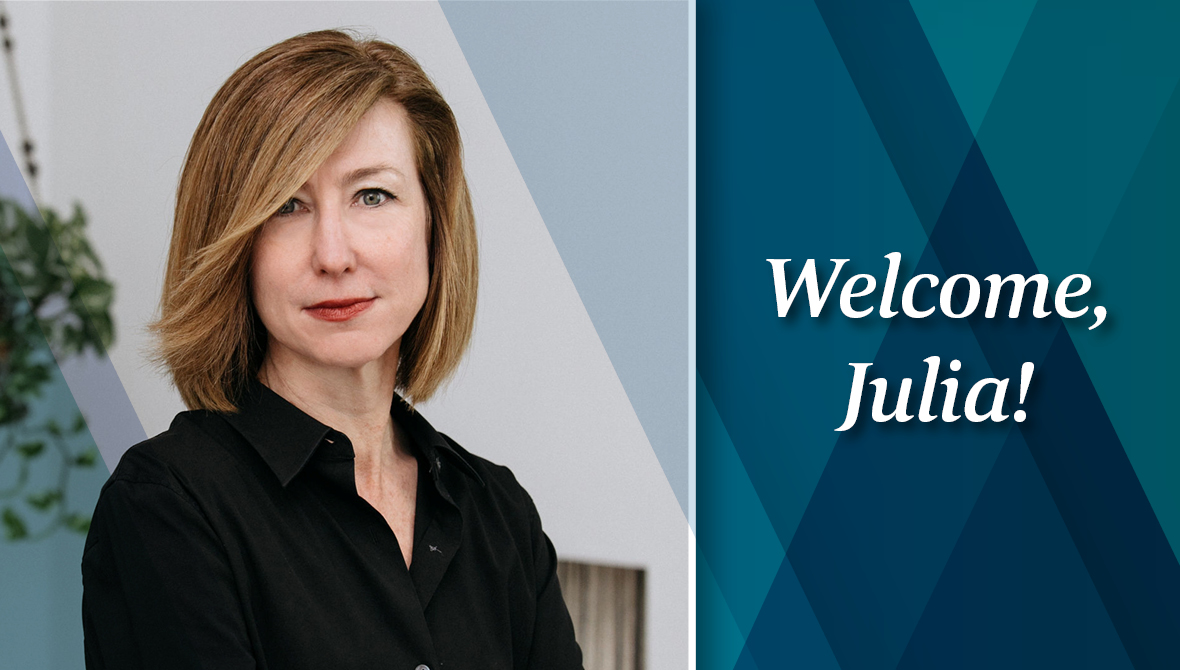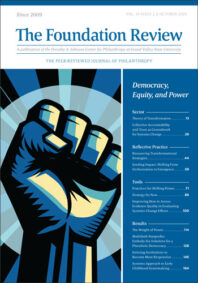Julia Coffman Named Editor-in-Chief of The Foundation Review


 Subscribe to the Johnson Center’s email newsletter to receive the latest news and content from The Foundation Review straight to your inbox!
Subscribe to the Johnson Center’s email newsletter to receive the latest news and content from The Foundation Review straight to your inbox!
The Johnson Center is thrilled to announce that Julia Coffman, senior advisor and founder of the Center for Evaluation Innovation (CEI), will be the next editor-in-chief of The Foundation Review, beginning January 2025.
With 30 years of experience supporting innovative approaches to strategy, evaluation, and learning in philanthropy, Julia brings deep expertise and a demonstrated commitment to knowledge-building and -sharing to this role. As founder and executive director of CEI from 2009 to mid-2024, she led the organization’s field-building and evaluation practice on advocacy, policy, and power-building initiatives. Before founding CEI, Julia led evaluation efforts for 15 years at the Harvard Family Research Project at the Harvard Graduate School of Education, which included editing The Evaluation Exchange, a periodical on innovative evaluation practice.
The Foundation Review was founded at the Johnson Center in 2009 as the first peer-reviewed journal of philanthropy in the U.S. Articles and full issues of the journal have been read and shared by practitioners, researchers, scholars, and students in more than 220 countries around the world. Hundreds of thousands of downloads testify to the critical demand for in-depth, unbiased insights, tools, and case studies across philanthropy.
Julia has a long and brilliant history with The Foundation Review. She has authored or co-authored 11 articles and served as a peer reviewer for over a dozen more. In fact, she is one of the journal’s inaugural contributors — “Tools to Support Public Policy Grantmaking,” co-authored with Martha Campbell, appeared in Volume 1, Issue 3 of the journal.
“The Johnson Center is incredibly proud to welcome Julia to this role,” said Lesley D. Slavitt, Ph.D., executive director of the Johnson Center. “She brings a unique brilliance to her work — she’s determined, unbiased, and dedicated to helping philanthropy achieve more.”
Before her first day in the role, Julia shared more about her vision for the journal; the importance of robust platforms for reflection, learning, and action; and one thing she can’t live without.
Julia, welcome! We’re delighted to have you onboard. You’ve been part of The Foundation Review community since the beginning. What draws you to the editor-in-chief role now?
I have spent almost my entire career as an evaluator working in philanthropy. I care deeply about supporting learning in the sector and using knowledge and insights to help build fields of knowledge and practice. The Foundation Review is a critically important, visible, and respected platform for philanthropic practitioners and scholars to share their ideas and learning. It has meant a great deal to me personally and professionally during the last 15 years and I am absolutely delighted and honored to lead its next chapter.
What do you see as the role of a peer-reviewed journal in philanthropy? Why is it important that a space like The Foundation Review exists?
This journal is such a unique offering in philanthropy. In a sector that needs to de-silo learning both within and across foundations, the journal offers a platform for sharing sector-wide what has been tried, what has or has not worked, and what can be learned by others. As a peer-reviewed journal, it promises high-quality and credible content in a familiar format.
How do you see philanthropy’s information and learning needs evolving – since the founding of the journal, and now as we transition into its next era? Where do we go from here? How can The Foundation Review help meet those needs?
We need to make sure that foundations are not wasting time or resources by reinventing the wheel or missing the opportunity to learn and build on what others have tried. In part, this means making sure people are connecting to the journal’s rich content that already has been and is still being produced. It also means making sure philanthropic practitioners are connected to and seeing the practical value in the content. I’m excited to experiment with some new ways of making that connection over the coming years.
Now here’s a question just for fun: What can’t you live without?
I’m a longtime Washington D.C. area resident and absolutely love the National Mall, particularly the Lincoln Memorial. I go there when I need to be inspired, when I need to reflect or get perspective, and when I want to celebrate. For many years my best friend and I went to the Lincoln on New Year’s Eve, toasting the year at midnight by sliding down the marble ramp next to the staircase. I’d share a video, but embarrassingly, I was never able to stick the landing.
In 2024, the journal celebrated its 15th anniversary with two special issues – the first, Celebrating 15 Years of Knowledge Building for Transformation, looks back on the most popular and influential articles in the journal’s history, paired with new prologues from the authors. The second issue, Democracy, Equity, and Power, features new, deeply thoughtful pieces on some of philanthropy and society’s most pressing calls for change. A webinar on December 11 — From Article to Action: Using insights from The Foundation Review to make change — will feature authors from both issues, including Julia Coffman. Register today!
Please join us in welcoming Julia to her new role. For more information or to reach Julia, please contact her at tfreditorinchief@gvsu.edu.